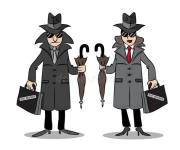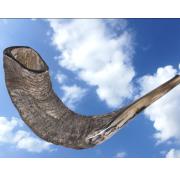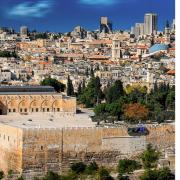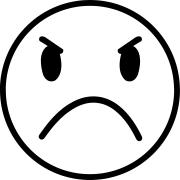The Toughest Battles of Life
Life is all about choices. But before I continue with this topic, I just wanted to state it once again, as always anything I write is just my opinion, an understanding of how I see the passages based on learning the Holy Books. With that out of the way, back to the choices. The definition of choice is an act of selecting and making a decision when faced with two or more possibilities. Some people choose the breezy, easy road, but some are seem to be stuck on the bumpy one. Our Torah is full of these scenarios of the giants of the yesteryears that fell or some that have risen to unbelievable spiritual heights. With your permission, let’s begin.
The Parashat Shemot 2:11-15 says, "He saw an Egyptian man striking a Hebrew man, of his brethren. He turned this way and that, and saw that there is no man, so he struck down the Egyptian and hid him in the sand." When Moshe’s crime was reported, he fled Egypt, ruled in another country as it says in Midrash, went to Yitro, was in jail, went through plenty of hardships, and then became the leader of the nation.
The Parashat Vayeshev 39:11 says, "Yoseph saw no man in the house" - when Potifar's wife tried to force him so he could be with her, he ran from her leaving his garment in her hands, which she used as a piece of evidence against him. She magnified this situation to the point where he was found guilty and had to be in jail for 12 years, and only then became the viceroy of Egypt.
In the Book of Prophet Samuel verse 24:1-16 says, that David had an opportunity to kill Shaul HaMelech when he was alone in the cave away from his troops, but chose to cut the corner of his garment - just to "get the king's attention", and to stop the king from further attempts to kill him. David could have killed him, but he chose not to.
All 3 had opportunities to do what was convenient or necessary at that moment.
- Moshe Rabbenu could have passed by, and not stood up for some slave, who was being beaten mercilessly by an Egyptian.
- Yosef could have slept with Potiphar's wife and he could have given in to those emotions of lust.. and hey, no one would have known.
- David could have killed King Shaul since that was what Shaul HaMelech had been trying to do to him for a long time. But David would have done it first since he had the opportunity to do that at that moment, and he could have always relied on the law - if he was coming to kill me, I could kill him first.
All the people above chose not to give in to those safe, familiar, and easily triggered emotions that drive one to sin. They went against those emotions and fought them - even though later their lives did not become smoother because of their choices. That ability to make hard and uncomfortable choices is a trait of the mighty, those who choose to go toward Hashem while making unpopular decisions.
The teshuva or repentance process and the keeping of the 613 commandments is the ladder to climb out from your current fallen state - after the sin, and to rise and become Adam before the sin - as he was in the Garden of Eden before he ate from the Tree of Good and Evil.
Moshe Rabbenu worked on his character traits, gave us the Torah, learned the Torah, and achieved the state of holiness, that Adam was in before he committed that sin.
Yosef HaTzaddik learned with his father, who taught him the secrets of Torah, who became a holy person, with the title of HaTzaddik, in whose merit the Red Sea parted when the nation of Israel was coming out from Egypt - HaYam Raah Ve Yanos, The sea saw and fled. (Tehillim 114:3).
David HaMelech went through many hardships but made repentance because of his deep devotion and prayer. He has climbed out from the level of Ben Adam and achieved the level where Hashem has called him His beloved. The Zohar Chadash in Parashat Lech Lecha says that he has become the fourth leg of the Merkava, the Divine Chariot of Hashem.
By overcoming their challenges and rising in holiness, the above individuals have placed themselves in the category of the Mighty - as Adam HaRishon was before he made the sin of eating the forbidden fruit.
But there's also the other side of the coin.
Chava, gave Adam HaRishon a fruit from the Tree of Good and Evil, and he ate it. In Bereshit 3:6 says, "וַתֵּ֣רֶא הָֽאִשָּׁ֡ה כִּ֣י טוֹב֩ הָעֵ֨ץ לְמַאֲכָ֜ל וְכִ֧י תַֽאֲוָה־ה֣וּא לָעֵינַ֗יִם וְנֶחְמָ֤ד הָעֵץ֙ לְהַשְׂכִּ֔יל וַתִּקַּ֥ח מִפִּרְי֖וֹ וַתֹּאכַ֑ל וַתִּתֵּ֧ן גַּם־לְאִישָׁ֛הּ עִמָּ֖הּ וַיֹּאכַֽל׃ - When the woman saw that the tree was good for eating and a delight to the eyes, and that the tree was desirable as a source of wisdom, she took of its fruit and ate. She also gave some to her husband, and he ate."
Per our Oral Torah tradition, the word לְאִישָׁ֛הּ - Le Yisha is translated as to her husband, due to a dagesh in the Hey - a dot in the last letter Hey. But as you know when the text is written in the Sefer Torah, it has no vowels and no dagesh, and the word לאישה - Le Yisha could also be translated as To a Woman.
Why would Hashem use this word which may be explained in two ways? There are other words Hashem could have used to make the same statement. Is Hashem trying to hint at something? Maybe this is where we need to concentrate more, since I believe, this is where deep understanding is hidden.
So, let's look at the word Le Yisha when translated as To Woman - as if Chavah passed the fruit to a woman. To me - it seems that Hashem had belittled Adam HaRishon because he listened to his wife - and didn't stand up to his wife, didn't protest, and ate when she offered him the fruit. That exact fruit from that tree that Hashem told him not to eat from. He had only this one commandment to keep, but he went along and sinned and went against the word of G-d.
This "habit" was passed on to their descendants—to the billions around the world, the Bnei Adam—the Sons of Man—who are on the same wavelength as Adam HaRishon—sinning and walking in his footsteps.
But, let's not stop here, and let's take this idea further.
The Sages tell us that when Hashem created heaven and earth, He did it with Midat HaDin - the strict judgment, but He saw that the world wouldn't be able to exist, so He changed it to lenient judgment - Midat HaRachamim.
In the same way, in Tosefta, Sukkah 2:3, we are told that there are two schools of thought—The House of Hillel or Bet Hillel or The House of Shammai or Bet Shammai. Bet Shammai is generally more stringent or restrictive, while Bet Hillel is more lenient.
Hashem saw that Adam and humanity as a whole would not be able to lead life by strict law, and would struggle with making sense of the difficulties they face in life. Above are the few - David HaMelech, Moshe Rabbenu, and Yosef HaTzaddik, and many more stories of the likes in the Gemara, that have risen to unbelievable heights and have become The Mighty - simple and ordinary people who have walked the thorny and tough road of life. They went through challenges, but in the end, they acquired their titles and became the examples for the nation.
The reason why Hashem compared Adam to Woman, is not because He belittled him, but because women are obligated to keep only three commandments, which are (1)the separating of challah, (2)lighting the candles, and (3)keeping the laws of family purity. And men are obligated to keep 613 commandments. Adam had one commandment to keep, and he failed. That's why Hashem sided him with those who kept the 3 commandments.
But there are plenty of righteous amongst the women, those that have kept their three commandments to the strictest in our history and are placed in the same group of The Mighty, together with Moshe Rabbenu, David HaMelech, Yosef HaTzaddik, and the like.
No wonder Talmud Sotah 11B says: "In the merit of the righteous women our ancestors were redeemed from Egypt." Why? Because women have kept the three laws they were given by G-d. And because of them G-d has redeemed us from Egypt and will do so as well in the future redemption - because of the ladies.
And we men - we are a bit behind.
Can I ask you a question? Do you rise or constantly fall when you battle in your life — with your obligations towards G-d or in your dealings with men? Do you give in or stand strong against the evil inside of you?
When we, the men fall, we are placed in the group of The Mighty in Progress...and are judged per Bet Hillel. How? Ever wonder, why people who are evil and those who fall in the keeping of the mitzvot, always seem to get a good judgment and sweet year? Because, in the eyes of Hashem, they are in the group of The Mighty in Progress, who are only required to keep the three laws, but since they are men, those laws do not apply to them, so they have little or no merit and accomplish very little at the end of the year. Hashem has mercy on them and pardons them from year to year. That's why Hashem takes away the tzaddikim of the generation from The Mighty group, in order to save the ones in The Mighty in Progress group.
Also, that's why on Chanukkah, we are told to light per the opinion of Bet Hillel - starting from one candle and adding another for the next eight days, because it builds us up, since we are weak in faith, and may crumble by the end if we were to go by Bet Shammai. Bet Shammai said to start with eight candles and go down to one on the eighth day. Only the Mighty will be able to go by Bet Shammai, grow from it, and become even stronger in faith - but we, the simpleton, are still not there yet.
This is - the toughest battle of all, but it separates the Mighty from the Weak.
Today - you can choose to stand with Adam, continue being weak, keep on sinning and falling, and rely on G-d's compassion, or be on the side of The Mighty, and for once become mighty yourself and join the ranks with Moshe Rabbenu, The Righteous Yosef, and King David.
So, Rise The Mighty of Israel!!
Son of Man - pick your side...!!
Shmuel Katanov














